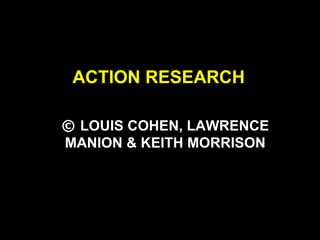
RMD 100Q Chapter18 cohen ak revised action research
- 1. ACTION RESEARCH © LOUIS COHEN, LAWRENCE MANION & KEITH MORRISON
- 2. STRUCTURE OF THE CHAPTER • Defining action research • Principles and characteristics of action research • Participatory action research • Action research as critical praxis • Action research and complexity theory • Procedures for action research • Reporting action research • Reflexivity in action research • Some practical and theoretical matters
- 3. ACTION RESEARCH • Action research is a small-scale intervention in the functioning of the real world to address practitioners’ own issues, and a close examination of the effects of such an intervention. • Kemmis and McTaggart (1992: 10): – ‘to do action research is to plan, act, observe and reflect more carefully, more systematically, and more rigorously than one usually does in everyday life’. • Action research combines diagnosis, action and reflection.
- 4. ACTION RESEARCH COMBINES 6 NOTIONS 1. A straightforward cycle of: identifying a problem, planning an intervention, implementing the intervention, evaluating the outcome; 2. Reflective practice; 3. Political emancipation; 4. Critical theory; 5. Professional development; and 6. Participatory practitioner research.
- 5. ELEMENTS OF ACTION RESEARCH • It works on participants’ own problems; • It seeks to improve practice; • It is collaborative and participatory; • It is problem-solving; • It is undertaken in situ; • It is an ongoing cycle of diagnosis, planning, implementation and evaluation; • It is methodologically eclectic; • It requires reflection; • It builds on professional development.
- 6. ACTION RESEARCH IS . . . • Critical (and self-critical) collaborative inquiry by • Reflective practitioners being • Accountable and making results of their enquiry public • Self-evaluating their practice and engaged in • Participatory problem-solving and continuing professional development.
- 7. PARTICIPATORY ACTION RESEARCH • It commences with explicit social and political intentions that articulate with the dominated and poor classes and groups in society; • It involves popular participation in the research process; • It regards knowledge as an agent of social transformation as a whole, constituting a critique of those views of knowledge (theory) as separate from practice; • Its epistemological base is rooted in critical theory and its critique of the subject/object relations in research; • It engages issues of power; • It raises the consciousness of individuals and groups; • It is a democratic activity.
- 8. ACTION RESEARCH AS CRITICAL PRAXIS • The emancipatory interest of Habermas: to understand and change the world • Ideology critique and action • People taking control of their own lives • A challenge to the illegitimate operation of power • A concern for equality and social justice • Empowerment of individuals and groups
- 9. CRITICISMS OF ACTION RESEARCH AS CRITICAL PRAXIS • It is uncritical and self-contradicting; • It will promote conformity through slavish adherence to its orthodoxies; • It is naïve in its understanding of groups and celebrates groups over individuals; • It privileges its own view of science (rejecting objectivity) and lacks modesty; • It privileges the authority of critical theory; • It is elitist whilst purporting to serve egalitarianism; • It assumes an undifferentiated view of action research; • It attempts to colonize and redirect action research.
- 10. THE ACTION RESEARCH CYCLE T h e n P la n R e s e a r c h I m p le m e n t A c tio n and M o n ito r F ir s t A c tio n P la n Act P la n a c tio n thoughtfully A c tio n (to g e th e r ) Reconnaissance (First Cycle) R e fle c t E v a lu a te R e s e a r c h F ir s t (o n A c tio n ) a c tio n a c tio n P r o d u c e D a ta and R e v ie w (R e s e a r c h ) P r o c e s s T h e n (s e p a r a te ly A n a ly s e a n d to g e th e r ) D a ta (Tripp, 2003)
- 11. IDENTIFY THE PROBLEM – CAUSES NOT SYMPTOMS Diagnosis: • What actually is the real problem? • What are the causes?
- 12. PLAN INTERVENTIONS Divergent Phase: • What actions are possible? • What alternatives are there? • Evaluate alternatives. Convergent Phase: • Which intervention will be adopted? • Decide from amongst the alternatives. Planning: • How will the intervention be implemented?
- 13. IMPLEMENTATION Putting the plan into action • Initiation • Development • Sustenance • Follow-up
- 14. EVALUATION How successfully has the intervention addressed the issue? • What are the success criteria? • How will you know if the intervention has been successful? • What are the outcomes of the intervention? • What ongoing monitoring will there be? • What will you do if the intervention is not working?
- 15. REFLEXIVITY IN ACTION RESEARCH • A self-conscious awareness of the effects that the participants-as- practitioners-and-researchers are having on the research process, how their values, attitudes, perceptions, opinions, actions, feelings etc. are influencing the situation being studied. • How the researcher/practitioner may be biasing the research.
